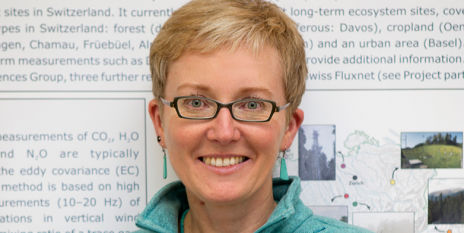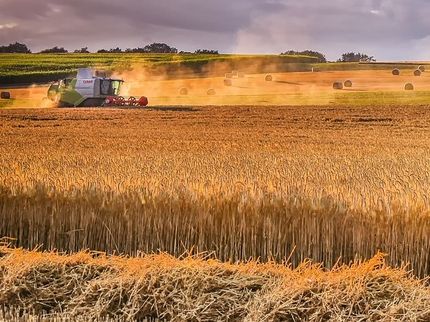Research priorities for a sustainable food system
Among the great research challenges for the future will be the efficient use of resources and the provision of healthy and safe food. Further details are given in a new study carried out by the World Food System Center at ETH Zurich commissioned by the Federal Office for Agriculture. An interview with ETH professor Nina Buchmann, chair of the World Food System Center and co-author of the report.

Nina Buchmann, ETH Professor of Grassland Sciences.
ETH Zürich
ETH News: The World Food System Center at ETH Zurich has addressed the need for research for a sustainable Swiss food system on behalf of the Confederation. What exactly is a food system?
Nina Buchmann: A food system encompasses all the food – and feed – produced and consumed in a country, as well as all the national actors and the national boundary conditions. In other words, it is a system that takes into account the production of food up to the consumption and health-related issues, but also all the resources, wastes and losses. In addition, a food system is influenced by various boundary conditions, created by economy, policy, society and environment.
And how will the Swiss food system change over the next 20 to 30 years?
It is of course impossible to predict the future in detail. What we can do, however, is consider current research questions globally, along with major global trends, such as population growth, scarcity of resources, climate change and changing consumer behaviour. Based on this, we can draw conclusions and define the key research questions that we must address in Switzerland, so that our food system remains sustainable in the coming decades. This was the main aim of the study – also in respect to the fact that these results will contribute to the Research Concept 2017–2020 of the Federal Office for Agriculture.
What are the most pressing research questions for the coming years?
Based on interviews and an online survey, we identified four major topic areas critical to achieving a sustainable Swiss food system. This includes research that focuses on the efficient use and therefore economical management of natural resources, such as soil, water, nutrients and energy throughout the entire food system. In addition, it is important to address research questions relating to healthy and safe diets. The third topic area we identified is policy research, which includes, inter alia, reconciliation of the sometimes conflicting aims of agricultural, environmental and trade policies. Finally, the fourth area is systems-oriented research to address questions arising along or between value chains.
What are the benefits of this kind of systems-oriented research?
If, for example, agricultural scientists and engineers discuss their research with farmers, wholesalers, social scientists or consumers even before the research begins or in its early stages, then already the research approaches can be established in cooperation with the stakeholders. This allows the research to address real-world problems and to deliver results that are easier to implement. Our survey also showed that competitiveness is seen as one of the biggest challenges the food system is facing. The problem here is that ‘competitiveness’ is a very vague term.
How so?
The need for action and research depends very strongly on the period over which one considers competitiveness. If you want to increase it in the short term, you will probably invest more in research relating to resource and energy efficiency, because this boosts economic viability. If, on the other hand, you are looking at competitiveness in 20 or 30 years, the focus will lie on very different research questions, such as plant breeding or consumer research; for example, which products will be in demand in the future and how they will be purchased.
What action is needed in relation to this systems approach?
At universities, we must incorporate this systems understanding more deeply into our education. At ETH, we have been doing this already for a long time in the study program of agricultural sciences. We also follow this approach in research at the World Food System Center. But we must be aware that systems-oriented, transdisciplinary research needs much more time than usually; for example, in order to find a common language or to build up a relationship of trust. Research of this kind requires longer-term research-funding instruments. Today, project-based funding is often awarded for a period of three or four years, which is typically too short for these purposes. Interestingly, the systems approach has also been deemed necessary at the administrative level and a need for action has been identified. Our interviews have shown that although several federal offices in Switzerland deal with individual aspects of the food system, there is no comprehensive national strategy at present.
And what conclusions do you personally draw from the study?
Results from our study contribute directly to the Federal Office for Agriculture’s research concept, which is currently under development. My work in agricultural and environmental research has probably never had such a direct impact. And I am pleased to note that just three years after the World Food System Center was founded, it has already established a reputation as an institution with an overview over such a very broad area of research. After all, the Federal Office for Agriculture has sufficient confidence in us to entrust us with such a comprehensive study.



























































